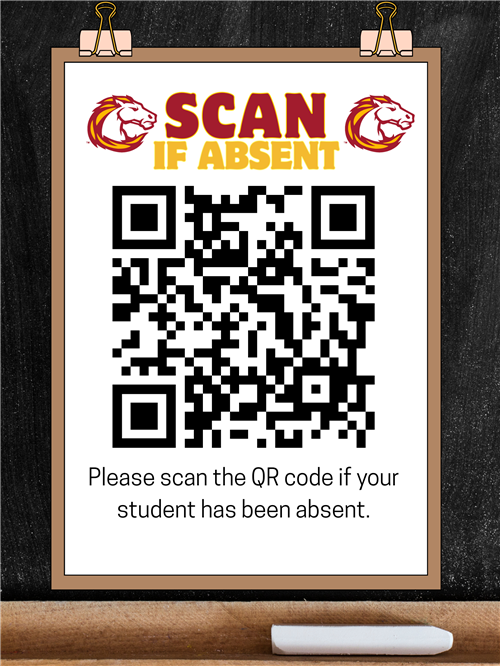-
-
Student Absences
A phone call to parents for any absence will be sent via the automated calling system. Written or emailed notes explaining the absence must be received within five (5) days of an absence. Every absence is considered unexcused until a written explanation for the absence is received in writing. The note or email should be directed to the front office. The student suffering an infectious or contagious disease, a serious illness, the severe illness of an immediate family member, the student’s exposure to a contagious disease, a death in the immediate family, fire or other serious damage to the home that requires the family to move, and similar circumstances constitute excused absences.
For additional information and district-wide expectations, please visit https://www.spsk12.net/domain/2099Please SCAN & fill out this form if your student was absent.
OR click the image to be taken to the same form.
School Attendance Matters
Did your student go to school today? School attendance is an important component of student learning and achievement in Suffolk Public Schools. When students are present, they are more likely to stay on track and progress academically, have more substantial social and peer connections, learn positive life skills, and have a better opportunity for an improved quality of life. Repeated absences from school can adversely affect your student's achievement.
The U.S. Department of Education defines chronic absenteeism as when students miss 10% or more of the total number of days enrolled during the school year. In a 180-day school year, 18 days of absence on average can impact a school's accreditation status. Suffolk Public Schools recognizes the following categories of absences that contribute to chronic absenteeism: Excused or unexcused absences for any reason, absences before involuntary withdrawals (i.e., suspension), absences for virtual learning, and absences for students placed in full-time facilities based on actual attendance data.
Missing lessons affect student learning, ultimately impacting academic achievement and advancement. Poor attendance can also affect social and emotional development. For example, students who are chronically absent in the early years of their education may not learn crucial school-readiness skills and abilities such as critical thinking and problem-solving. Middle and high school students who are chronically absent have a significantly higher dropout rate. When students improve their attendance rates, they improve their academic prospects and chances for graduation and promotions.
Our students, staff, and parents must work together to reduce chronic absenteeism. We cannot stress enough the need to be present in school every day and how student attendance directly impacts your student’s success. For any questions or additional information, please contact the School Administrative Offices at 757-925-6750.
-
Select a School...
Select a School
- Booker T. Washington Elementary School
- Creekside Elementary School
- Elephant's Fork Elementary School
- Florence Bowser Elementary School
- Hillpoint Elementary School
- Kilby Shores Elementary School
- Mack Benn, Jr. Elementary School
- Nansemond Parkway Elementary School
- Northern Shores Elementary School
- Oakland Elementary
- Southwestern Elementary School
- Lakeland High School
- King's Fork High School
- Nansemond River High School
- Turlington Woods School
- College & Career Academy at Pruden
- Col. Fred Cherry Middle School
- Forest Glen Middle School
- John F. Kennedy Middle School
- John Yeates Middle School
- King's Fork Middle School


